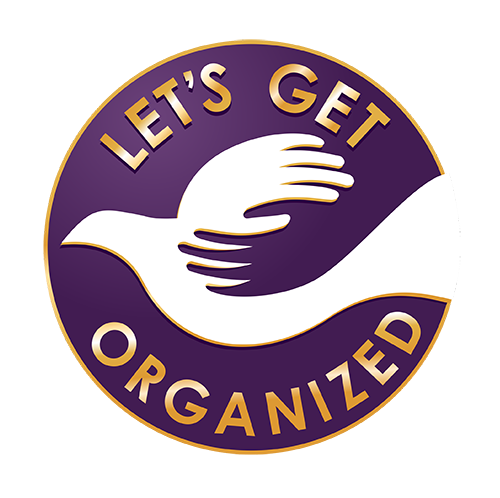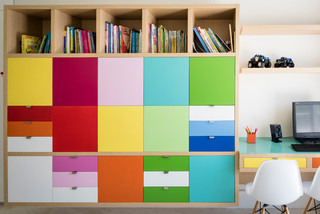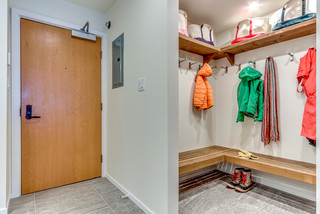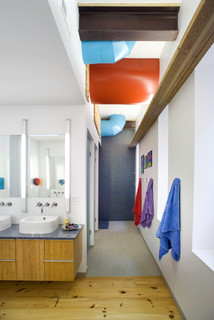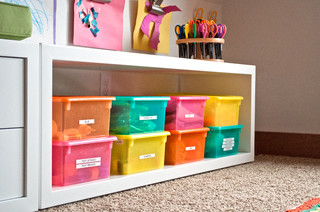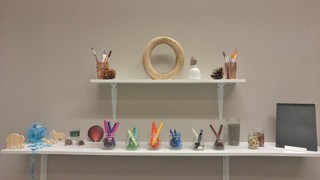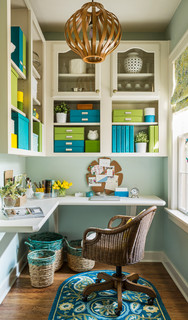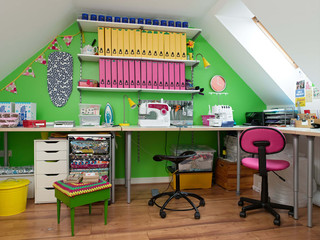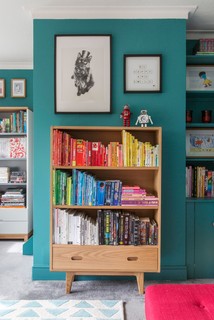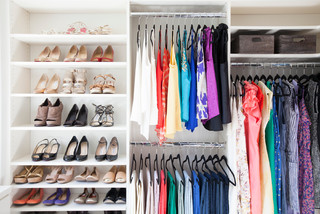Color-coding is one of my favorite ways to organize! I color-code everything, from clothes to files to cookware to calendars. While these photos are of professionally staged spaces, color-coding can work in your life and the way you live it. Try it and let me know how it goes.
The principle behind organizing with color is simple: It’s quicker and easier to recognize a color than it is to read a label. When you assign meaning to a certain color, it’s easier to quickly find what you need when you need it.
Read on for 10 ways to color-code your way to organized bliss.
1. Color-coded cabinets. Remembering what goes where is easier (and more fun) with bright, colorful cabinet and drawer fronts like the ones shown here. As a DIY alternative, paint each drawer of a dresser a different hue, or use colorful knobs and pulls to set each drawer and cabinet apart.
2. Color-coded tote bags. Assign a different colored tote to each family member, or pick a color to represent an activity (blue for swimming, red for soccer), and you can tell at a glance which bag is which. In big families, staying consistent with a single color for each family member makes it easy to identify whose stuff is whose (see No. 3, towels).
3. Color-coded towels. Nobody likes reaching for their towel on the way out of the shower only to find that it’s damp … because someone else used it. Assign a towel color to each member of the household, and you can avoid the dreaded damp-towel situation for good.
4. Color-coded craft bins. Choose a color to represent each type of art supply you want to keep on hand (glues and tapes, paintbrushes and rollers, collage materials). If the bins themselves are different colors, that’s great, but if not, no worries — you can still color-code with stickers.
5. Color-coded toy storage. To keep things simple, think of just a few main categories for toys — building materials (Lego bricks, blocks), figures (plastic animals, dolls) and dramatic play (costumes, doctor kit) — with a different color assigned to each category. This color-coding practice can be especially helpful if you rotate toys by keeping extras in a closet or storage area. Just look for a bin of the same color to swap, and you’ll know you still have a balance of all types of toys.
6. Color-sorted art supplies. There’s something inspiring about seeing all the variations in color within a single hue — not to mention, it makes it easier to grab the color you’re looking for. Whether the artist in the house is you or your 5-year-old, this couldn’t be easier to set up: Just line up some recycled jam jars and get sorting.
7. Color-coded document storage. Knowing what’s where when it comes to financial documents and records is essential — but it’s not always easy. Make it quicker to find things at a glance by deciding on a different color for key areas of your life (home, business, kids), and stash papers in storage boxes of the same hue. Want to take it a step further? You can do the same with colored file tabs inside the filing cabinet too.
8. Color-coded photo albums. Whether you put together your own albums or order photo books online, choosing different colored spines based on the type of content can help you find the album you want at a glance. For instance, make all your vacation and travel albums blue, and your family albums yellow.
9. Color-sorted books. This can be a polarizing issue. Either you’re a visual person or you’re not, and how you feel about color-sorted bookshelves may be a good indicator of where you stand on that spectrum. If you are a visual person, you may actually find it easier to locate the book you’re looking for based on the color of its spine. If not, this may not be the best organizational system for you! (But it sure is pretty.)
10. Color-sorted wardrobe. Make coordinating outfits a bit easier by hanging your clothes in rainbow order. This can help you see your wardrobe in a fresh way and, if nothing else, will surely give you a little boost of joy every time you open your closet doors.
Need help organizing with color? Call me!
